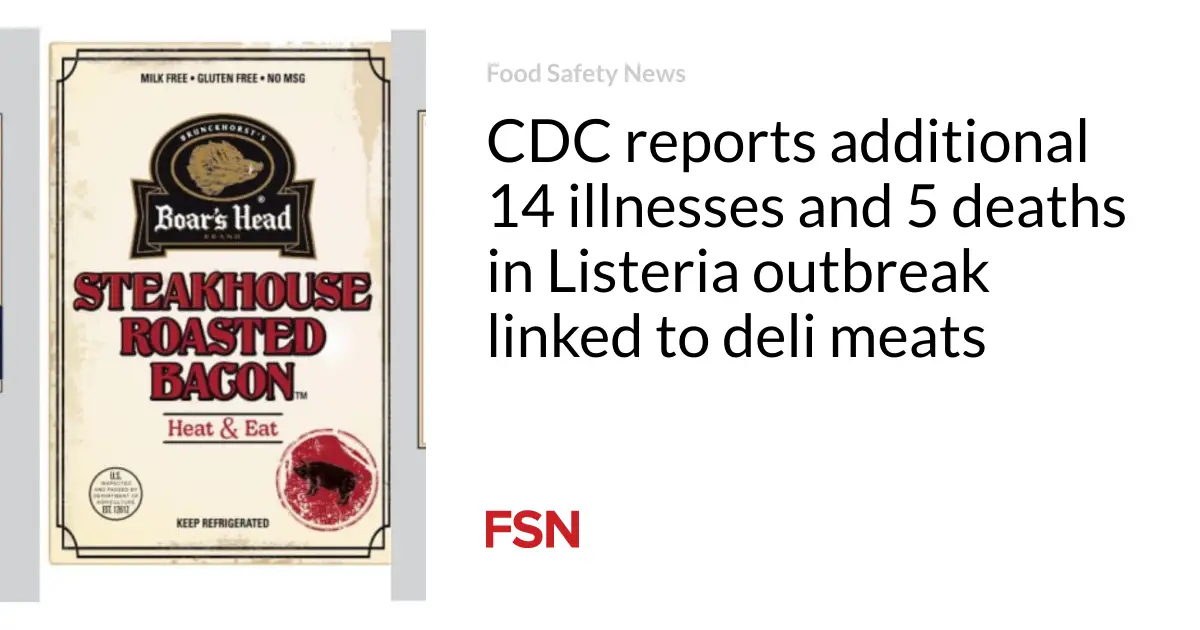
The Centers for Disease Control and Prevention (CDC) has reported new cases and deaths associated with the ongoing Listeria monocytogenes outbreak linked to Boar’s Head deli meats. Since the last update on Aug. 8, 2024, 14 more people have fallen ill, and five additional deaths have been confirmed, bringing the total number of cases to 57 across 18 states.
This outbreak has proven particularly severe, with all 57 confirmed patients requiring hospitalization. In total, eight people have died, including recent deaths in Florida, Tennessee, New Mexico and South Carolina. Public health officials emphasize that the true number of cases may be higher, as not all individuals who fall ill seek medical attention or are tested for Listeria.
Source of the outbreak
Epidemiologic, laboratory and traceback data have identified meats sliced at deli counters as the primary source of the outbreak.
Outbreak investigators in two states have found Listeria in Boar’s Head deli meats. The Maryland Department of Health and Baltimore City Health Department collected an unopened Boar’s Head liverwurst product from a retail store and identified Listeria monocytogenes. The New York State Food Laboratory also identified Listeria monocytogenes from a sample of unopened Boar’s Head liverwurst products collected by the New York State Department of Agriculture and Markets’ Division of Food Safety and Inspection from retail stores. Whole genome sequencing determined both to be the same strain that made people sick in this outbreak.
Of the 44 people interviewed by public health officials, 41 reported consuming deli meats, and 39 of those had eaten meats sliced at a deli. Notably, 25 of the 41 individuals who were asked specifically about liverwurst confirmed they had consumed deli-sliced liverwurst before becoming ill, with 19 mentioning the Boar’s Head brand.
The CDC and state health departments are continuing their investigation, working closely with the U.S. Department of Agriculture’s Food Safety and Inspection Service (USDA-FSIS) to identify and recall affected products. Boar’s Head has already recalled over 7 million pounds of deli meats due to the outbreak. These products, which include liverwurst and potentially other deli meats, have “sell by” dates extending into Oct. 2024, raising concerns that contaminated products may still be in consumer homes.
The recalled products have a 44-day shelf life and were produced as recently as July 17. There is concern that consumers may have recalled deli meats in their homes. The recalled products can be identified by certain codes on the USDA mark of inspection, such as “EST. 12612” or “P-12612” on the product labels.
Refrigeration and freezing do not kill Listeria bacteria. The bacteria can remain viable for extended periods and spread easily among deli equipment, surfaces, hands and food. This resilience, combined with the long incubation period of up to 10 weeks, complicates outbreak containment efforts.
The CDC advises anyone with recalled products to discard them immediately and thoroughly clean any surfaces, containers and refrigerators that may have come into contact with the meats.
A list of recall items can be viewed here.
About Listeria infections
Food contaminated with Listeria monocytogenes may not look or smell spoiled but can still cause serious and sometimes life-threatening infections. Anyone who has eaten recalled products and developed symptoms of Listeria infection should seek medical treatment and tell their doctors about possible Listeria exposure.
Also, anyone who has eaten any of the recalled products should monitor themselves for symptoms during the coming weeks because symptoms of listeriosis can develop up to 70 days after exposure to Listeria.
Symptoms of Listeria infection can include vomiting, nausea, persistent fever, muscle aches, severe headache, and neck stiffness. Specific laboratory tests are required to diagnose Listeria infections, which can mimic other illnesses.
Pregnant women, the elderly, young children, and people such as cancer patients who have weakened immune systems are particularly at risk of serious illnesses, life-threatening infections, other complications, and death. Although infected pregnant women may experience only mild, flu-like symptoms, their infections can lead to premature delivery, infection of the newborn, or even stillbirth.
(To sign up for a free subscription to Food Safety News, click here.)






